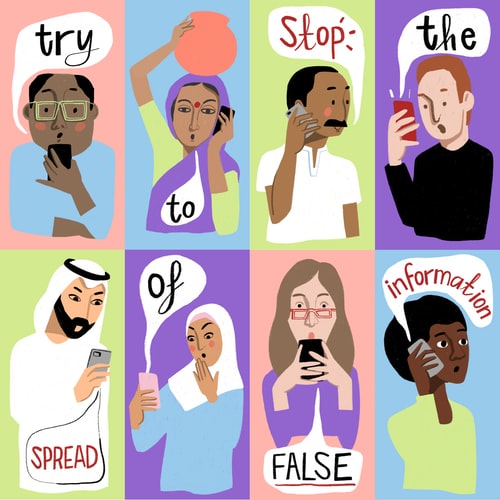This article is written by Shivank Kumar, a student of Symbiosis Law School, Noida and Dikshi Arora, a student of RGNUL, Patiala. In this article, the authors explains the menace of fake news and how is it a threat to the national security.
‘Fake News’- Word of the Year, 2017 by Collins Dictionary. It is much debated in communication fields and social sciences. It got popularised in the 2016 US Presidential election and Brexit. Fake propaganda and misinformation has the potential to polarise public opinion, to incite violence and extremism. Various reports and incidents have been included in the paper to show the gravity and impact disinformation and rumors have on national security. The measures taken by government are limited to internet shut downs or blocking or deleting the influencer accounts. Commonly used methods are highly criticized on ground of violation of freedom of speech and expression etc. Shift has to be made from absolute restriction to reasonable while addressing the question of national security at large. Absolute ban on media is an attack on freedom of the press. Government measures such as FACT and new possible solution to the problem have been proposed.
The term ‘fake news’ was widely used in the press coverage of the 2016 presidential elections of the United States. There is much debate in the communication fields and social sciences about the applicability of this concept or mere term. It is an interesting fact that the term ‘fake news’ was declared as Word of the Year 2017 by Collins dictionary.
The Brexit in the UK and 2016 US presidential elections has become the symbols of the “post-truth and fake news phenomena”. In the past few years we have seen that the spread of fake news has led to many problems and challenges to the nations. In recent years we have witnessed how it can be detrimental for the political scenarios of any country. From influencing decision of a voter in a democracy to spreading false propaganda, social media influenced masses in past few years. Prior to the existence of internet it was lot more difficult and costlier for the people to disseminate information but now the situation is not the same.

“Propaganda, misinformation and “fake news” have the potential to polarise public opinion, to promote violent extremism and hate speech and, ultimately, to undermine democracies and reduce trust in the democratic processes.”
The countries which are already suffering from ethnic tensions, misinformation can exasperate a lot of tensions and can also generate violence. Rumors spread through fake news can create a lot of social turmoil in a country or among the countries. Fake news and disinformation are definitely a threat to a nation’s security both externally as well as internally. In perhaps, the well-known case, Myanmar during the Rohingya crises Facebook was used as a tool or weapon by the people to incite violence against the Rohingya Muslims. Buddhists were influenced by the rumors which led them to target Muslims. To retaliate the harm caused on Muslim in Myanmar, Indian Muslim attack Bodh Gaya temple of India. In India, rumors spread by Whatsapp led to many communal riots. Riot in Muzaffarnagar in 2013 where around 50 people were killed is the example of one such case out of many which takes place every year.
Jammu & Kashmir witnessed internet shutdowns quite in high frequency after any military operation takes place or after any act related to the state, which is of sensitive nature, is passed by the legislature in order to restrict the circulation of fake news and misinformation which can make situation worst. In valley, it is often seen that there are many rebellious groups which tries to incite people against the government by propagating false information. For example, the Hurriyat conference (a separatist group) led by the Gilani’s which is inclined towards Pakistan.
A plea was filed by an Advocate Anuja Kapoor in April 2019 opined that there should be liability, responsibility and accountability of the departments concerned to prevent or restrict the spread of misinformation and fake news- “The non-restraining of various fake news travelling on social media handles leads to crimes against humanity such as mob lynching, abetment to murder, sedition, communal riots, influence in elections, mass hysteria,” the plea said. But the Supreme Court bench headed by then Chief Justice of India Ranjan Gogoi dismissed the plea and also sought directions for the Ministry of Law, Information and Broadcasting, and Ministry of Home Affairs to form a committee for handling fake news on various social media platform.
Across the country, there is a rise in numbers of mob attacks fueled by rumors spread by using social media handles like Whatsapp, Facebook, twitter etc. According to the report by BBC at least 31 people were killed in the past two years and more than a dozen were injured. These are only the numbers verified by BBC. Many more incidents have been reported and still to be verified and find place in official record. Many of the false rumors warn people that there exists child abductor in their towns which drives people to target innocent man who is unknown to the community. A total of 25 men, 4 women and 2 people from unknown gender were lynched by the mob leading to their death. Whatsapp in particular has become a breeding ground for distorted messages and disinformation and fake news and videos, thanks to its system of anonymity. The ability to forward message on Whatsapp has easily allowed the process of rapid spread of information, without its original content and a link to original author. At present, there are 200 million Whatsapp users and it is projected that the number may go up to 450 million by 2020. Therefore, some serious measures must be taken to prevent these kinds of incidents as they clearly lead to violation of human rights.
In order to curb this problem the measures taken by the government are mere limited internet shutdowns or blocking or deleting the influencer accounts (although for short period). According to the ‘The Wired’ report it is noticed that there have been 100 internet shutdowns in the country in past one year only. A study done by Stanford University found that 47 % of these shutdowns happened in politically tumultuous state of Jammu and Kashmir. Shutdowns vary from slowing down the net speed to total internet blackouts. They are ordered by the local government often in an attempt to curb the spreading of false rumors on social media and quell public interest. Some researchers also suggested that these shutdowns are ineffective, and that misinformation, rioting and political turbulence still occur during shutdowns.
With the main to restrict the spread of fake news and disinformation, the ministry of electronics and information technology released draft changes to the Information Technology Act of 2000 that would require social platforms like Whatsapp, Facebook, twitter etc to start tracing the origin of message and the creator of that content when compelled by the government.
Involvement of The European Union in the fight against fake news and misinformation show the graveness of this issue. Since fake news is one of the phenomenon which have an increasingly destructive potential. The European Commission has announced the formation of an expert group to make a strategy to tackle this problem. According to EU Commissioner Gabriel, “fake news stifle the media and society”. She is pushing for an EU- level analysis to assess the degree to which fake news and misinformation menaces the Union and suggests whether it is likely to find a possible solution to that phenomenon. The main challenge is to define fake news and good journalistic practices.
Fake news, state-funded disinformation and propaganda directly challenge the question of national security and the democratic set-up of any nation. The whole system and set-up has turned into more complicated and complex state, and the challenges that it present cannot be met by mere simple solutions; they require open, deep and critical analysis.
Politician too spread lies in the name of alternative truth or reality and every lie has some element of truth in it. No one has monopoly over truth. It is through debate and discussion the truth upgrade. Truth cannot be objective in nature but it holds subjectivity as it better half. The truth is pivot and infrastructure of any liberal democratic set-up. A world cannot be entirely based on feelings, beliefs and opinion without facts.
Commonly used method by government and states are highly criticized on ground of violation of freedom of speech and expression and suppression of individual voice. Shift has to be made from absolute restriction to reasonable and rational restriction while taking into account the question of national security at large. From news like 2,000 rupee currency note has spying technology to exclusion of Indian Muslim citizen in Citizenship Amendment Act the need of better solution to curb this cannot be denied. India lack media policy for verification and hence, spreading lies costs less in time as well as money. Authority randomly arrest people with the charges of making fictitious articles, if there are chances of inciting violence and conflict in the society.
In 2018, it was declared by Information and Broadcasting Ministry that it would direct an authority to cancel the accreditation of journalist and reporters if found guilty of sharing fake news or propaganda. Later this plan was withdrawn following mass outcry and criticism. Media is often called fourth pillar of the democracy. Complete or absolute ban of such type is an attack on freedom of the press.
Several activists who work for curbing false news became victim of mob attack. Sukanta Chakraborty from Tripura was appealing to the public to refrain from rumor-mongering became victim of a mass hysteria and was lynched. Recently (Nov, 2019), Indian ministry of information and broadcasting decided to set up formal mechanism after news of PM Narendra Modi congratulating Chief Justice of India over the Ayodhya verdict was spread in Bangladesh. It has been planned to set up FACT (Find, Assess, Create and Target) mechanism to keep check on circulation of fake news by monitoring online sources and keeping track of social media posts.
Government must initiate the drafting process of compiled Act that constitutes clearly stated provision and punishment so that no innocent is dragged to court of justice. There is need of codified rules in order to check the authenticity and reason of arrest of rumor-monger by official. Online platform, social media or other such private companies that act as a platform to communicate, too has desired role to play in this process of curbing fake news. It is their responsibility to check the validity of information and disclose the details creator before passing liability to government to do the same. It is a responsibility of every individual to combat the scourge of fake news. It can include improving digital literacy among the general public and supporting investigative journalism.
“The government has no mandate to control the press”
-Gautam Lahiri, President of the Press Club of India
LawSikho has created a telegram group for exchanging legal knowledge, referrals and various opportunities. You can click on this link and join:
 Serato DJ Crack 2025Serato DJ PRO Crack
Serato DJ Crack 2025Serato DJ PRO Crack










 Allow notifications
Allow notifications


